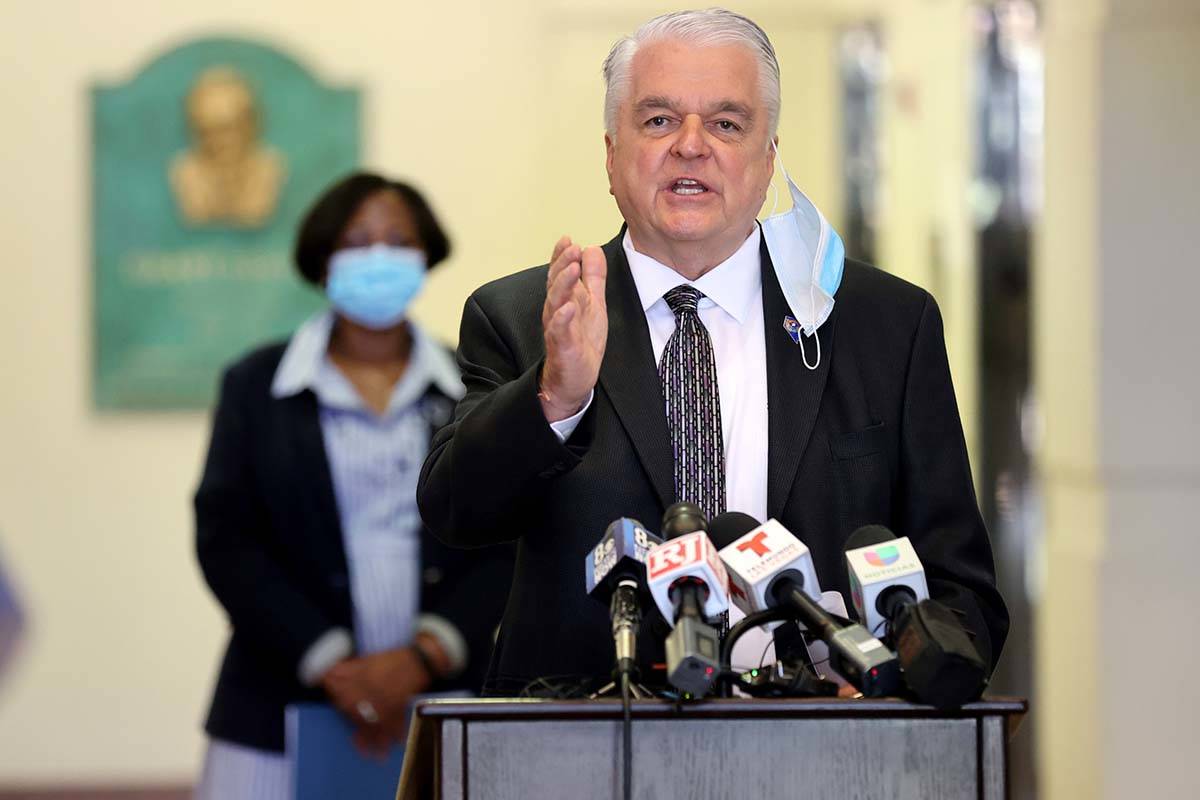Nevada businesses get more than 600 coronavirus-related complaints
The complaints are numerous and appear, at times, repetitive.
“Employees are not being allowed to wear masks or face coverings, potentially exposing them to COVID-19 hazards,” reads one description of a complaint sent May 28 to the Nevada Occupational Safety and Health Division.
“The owner of the establishment is ignoring the (governor’s) orders for the COVID-19 reopening roadmap by allowing parties with up to 200 people to take place, despite the current limit of no more than 50,” reads another, dated June 8.
Nevada agencies tasked with making sure businesses operating amid the pandemic are doing so in line with the governor’s protocols have received more than 600 complaints since Nevada began reopening in early May.
“Everybody and anybody right now thinks they should be open. Everybody thinks that they don’t have to follow the rules,” Clark County Commission Chair Marilyn Kirkpatrick said Tuesday at a commission meeting.
Despite the number of complaints against businesses, many were found to be unsubstantiated or met with little consequence.
Shutdown
Gov. Steve Sisolak ordered a statewide shutdown of nonessential businesses mid-March to help curb the spread of the novel coronavirus. He allowed some businesses to reopen last month under specific guidelines.
In the first round of reopenings May 9 dubbed Phase One, hair and nail salons, retail shops and dine-in restaurants could reopen if they enforced social distancing, required employees to wear face coverings and limited their maximum capacity by half. And during the second round that began May 29, bars, gyms and recreational facilities could reopen with similar rules and a gathering limit of 50 people.
Kirkpatrick, who sits on a state advisory panel that helped develop the business compliance plan for reopening guidelines, told the Review-Journal one week after Phase One’s reopenings that enforcement had been “effective.”
“All agencies agreed that our first method would be to educate folks,” she said at the time. “Nobody is trying to go out and fine everybody first. That’s the last thing we’re trying to do. We’re trying to help them.”
During Tuesday’s commission meeting she said the advisory panel recommended Sisolak refrain from further openings as the number of people with the coronavirus trends upward.
Kirkpatrick did not respond to a request for comment Wednesday.
State enforcement agencies — local jurisdictions, licensing boards and the Nevada Occupational Safety and Health Division — said the primary means of enforcing compliance continues to be education, with further punishments usually accompanying repeat offenders.
William Sousa, the director of UNLV’s Center for Crime and Justice Policy, said businesses may be getting mixed messages.
Transitioning from Phase One to Phase Two sends a message of progressive rules relaxing to businesses, while local jurisdictions each have their own rules about what is allowed or recommended, he said. Enforcement agencies see that, too, and they lean on their relationship with the business to determine how to address a violation, he said.
“When you begin to relax things, the horse is out of the barn, so to speak,” Sousa said.
Though Sisolak previously praised Nevada’s businesses for following safety guidelines as they reopened under Phase One, he reminded them Monday that reopening under Phase Two does not mean the pandemic is over.
“We’re in the middle of a COVID-19 pandemic. We’re right, dead smack in the middle of it,” Sisolak said.
Local jurisdictions
Through Tuesday, the city of Las Vegas’ business licensing bureau received 137 coronavirus-related complaints via email or the website; 123 came during Phase One and 14 during Phase Two, according to city spokesman Jace Radke.
Metro handled Phase One complaints, and it’s unclear how many were substantiated, he said. In Phase Two, eight complaints were substantiated, and licensing officers handed those businesses a copy of the governor’s directives and educated them on the industry-specific requirements, Radke said. Another three complaints received Monday are still under review.
In Phase One, most complaints in Las Vegas were for nonessential businesses open that shouldn’t be like gyms, salons and retailers, as well as several complaints about golf courses with groups golfing or an open club house, Radke said.
During Phase Two, he said, the majority of complaints are against salons, barbershops, taverns and restaurants. They focus on employees not wearing face coverings or businesses failing to enforce social distancing.
Businesses that are open and shouldn’t be, Radke said, risk the business licensing bureau calling for Metro’s help. Licensing staff will educate businesses that fail to enforce social distancing or face mask rules, he said.
The city’s escalating punitive measures for continued noncompliance include a violation, a $250 fine, a disciplinary complaint and a hearing.
North Las Vegas received 103 complaints during Phase One and 28 thus far during Phase Two, city spokeswoman Sandy Lopez said. Fifty-three of those were substantiated in the first phase, and 25 in the second were found to be compliant with reopening directives. The remaining three in Phase Two remain open cases.
Lopez said city inspectors cited one business for failing to comply with a closure order in Phase One and it was ordered to remain closed, but no such punishment has been doled out in Phase Two.
Henderson isn’t closely tracking the number of warnings it issues or complaints it receives, but city spokeswoman Kathleen Richards said Tuesday that the city has received about 19 complaints in the past two weeks.
Richards said Henderson hasn’t closed any businesses and has instead focused on education. Businesses out of compliance are first issued a warning. A second time draws a stop-work order and a $500 penalty per violation, while a third time risks a business’ closure.
Clark County did not provide compliance information.
Statewide
The Nevada Occupational Safety and Health Division received more than 470 complaints in Southern Nevada related to COVID-19 between March 16 and Tuesday, according to agency data. During Phase One, OSHA received 96 complaints in 20 days. From May 29 to Friday in Phase Two, OSHA received 54 complaints in 15 days.
Many of those OSHA complaints fit a theme among complaints filed with other Southern Nevada cities and agencies: Some businesses aren’t enforcing social distancing or requiring that employees wear face coverings.
OSHA can issue a citation to a business and require immediate rectification if inspectors find a violation. It’s considered a serious violation and may come with a fine up to $13,494, “although there are a number of factors such as size of employer, employer history, the gravity of the violation and others that are taken into consideration when calculating the penalty,” spokeswoman Teri Williams said.
Hair and nail salons and barbershops were allowed to open as part of Phase One, and other beauty businesses could open during Phase Two.
The Nevada Board of Cosmetology received 80 complaints, 24 of which where substantiated, regarding the governor’s directives during Phase One, compliance coordinator Leah Easter said. The board has received 109 related complaints since Phase Two began, and 33 of those were found to have merit.
“Some instances of noncompliance were resolved while the inspector(s) were still present in the salon(s),” Easter wrote in an email.
The board issued roughly 80 warnings and citations since Phase One began, she said. “The bulk of the citations” were for failing to properly disinfect or throw out scissors, nail files, combs and other items between customers.
Contact Mike Shoro at mshoro@reviewjournal.com or 702-387-5290. Follow @mike_shoro on Twitter.


















